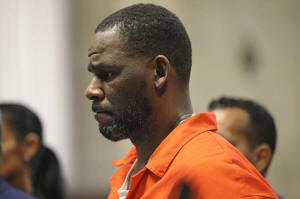Federal appeals court upholds singer R. Kelly's convictions and 30-year
prison term
 Send a link to a friend
Send a link to a friend
 [February 13, 2025]
By LARRY NEUMEISTER [February 13, 2025]
By LARRY NEUMEISTER
NEW YORK (AP) — R. Kelly’s racketeering and sex trafficking convictions,
along with a 30-year prison sentence, were upheld Wednesday by a federal
appeals court that concluded the singer exploited his fame for over a
quarter century to sexually abuse girls and young women.
The 2nd U.S. Circuit Court of Appeals in Manhattan ruled Wednesday after
hearing arguments last March.
The Grammy-winning, multiplatinum-selling R&B songwriter was convicted
in 2021 in Brooklyn federal court of multiple charges, including
racketeering and sex trafficking.
Attorney Jennifer Bonjean, representing R. Kelly, said in a statement
that she believed the Supreme Court will agree to hear an appeal. She
called the 2nd Circuit ruling “unprecedented," saying it gives
prosecutors limitless discretion to apply the racketeering law “to
situations absurdly remote” from the statute's intent.
Last year, the high court declined to hear an appeal of a 20-year
sentence Kelly received after he was convicted in 2022 of child sex
charges including charges of producing images of child sexual abuse in
Chicago.
The 2nd Circuit rejected Kelly's arguments that the trial evidence was
inadequate, the constitutionality of some state laws used against him
were questionable, four jurors were biased, the trial judge made some
improper rulings and a racketeering charge more commonly used in
organized crime cases was improper.

“Enabled by a constellation of managers, assistants, and other staff for
over twenty-five years, Kelly exploited his fame to lure girls and young
women into his grasp,” the appeals court said, noting members of his
entourage helped introduce him to underage girls.
“Evidence at trial showed that he would isolate them from friends and
family, control nearly every aspect of their lives, and abuse them
verbally, physically, and sexually,” the three-judge panel said.
The appeals court said it was “neither arbitrary nor irrational” that
several accusers were permitted to testify at trial that Kelly gave them
herpes without disclosing he had an STD, and it was not unduly
prejudicial or cumulative that seven witnesses who were not yet adults
when Kelly began to abuse them were allowed to testify.
[to top of second column]
|

In this Sept. 17, 2019 file photo, R. Kelly appears during a
hearing at the Leighton Criminal Courthouse in Chicago. (Antonio
Perez/Chicago Tribune via AP, Pool, File)
 “None of the testimony was more
inflammatory than the charged acts,” the appeals court said.
The 2nd Circuit also said it was not unfairly prejudicial for the
trial judge to let jurors view graphic videos. The videos, the
appeals court said, “were properly admitted to show the means and
methods of the enterprise, including the level of control and
dominance Kelly had over his victims.”
Bonjean, in her statement on R. Kelly's behalf, also cited a partial
dissent in which one 2nd Circuit judge, Richard J. Sullivan,
concurred with what he described as the majority's “excellent
opinion,” but dissented in part over a restitution award given one
victim for a lifetime supply of a suppressive regime of herpes
medication. The award was based on the cost of the brand-name drug
when a generic drug is available.
“This was not restitution. This was an effort by the government to
unfairly enrich government witnesses for their testimony,” Bonjean
said.
Kelly, born Robert Sylvester Kelly, is known for work including the
1996 hit “I Believe I Can Fly” and the cult classic “Trapped in the
Closet,” a multipart tale of sexual betrayal and intrigue.
Kelly sold millions of albums and remained in demand even after
allegations about his abuse of young girls began circulating
publicly in the 1990s. He was acquitted of child sexual abuse image
charges in Chicago in 2008, but a second trial in Chicago in 2022
ended with his conviction on charges of producing images of child
sexual abuse and enticing girls for sex.
Widespread outrage over Kelly’s sexual misconduct did not emerge
until the #MeToo reckoning, reaching a crescendo after the release
of the documentary “Surviving R. Kelly.”
All contents © copyright 2025 Associated Press. All rights reserved
 |